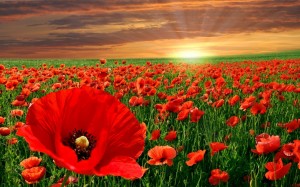Remember who gave us freedom to be artists
Posted on November 8, 2014 By Jeremy Loome Culture, Front Slider, Life, News

John McCrae, 1914
In Flanders Fields The Poppies blow
Between the Crosses, Row on Row
In 1933, one of the first political moves Adolf Hitler took to solidify his control over the population of Germany was to control the media. He nationalized newspapers so that he could sow propaganda , then begin a pogrom against the Jewish community, ultimately resulting in Crystalnacht, and policies of genocidal extermination.
Hitler, clearly a sociopath with severe narcissistic delusions, was a failed artist, who based his racist policies on religious bigotry fomented by a Catholic priest’s anti-semitic weekly newspaper column. His arts background enamoured him of the creative process, but he never understood it; like any sociopath, his only perspective was how he could manipulate art for personal gain. Long before he was Chancellor of Germany, he ran a counterfeit art scam with a colleague while living on the streets of Vienna.
That mark our place, and in the sky
the larks, still bravely singing, fly
Scarce heard amid the guns below
Even though John McRae’s epic poem was an homage to dead comrades, first read at the funeral of a friend, McRae’s words have always stood for something even greater than mere sentiment: self-sacrifice. McRae. like all of those brave men , understood the importance of community, of pride in what each nation stood for, and exactly why those men died.
He expressed it poetically, not just with In Flanders Fields, but with an entire volume of verse.
Long before the foolish modern paralysis of base ideology between left and right; and long before the class warfare growing in North America; and long before we began to argue whether art, that most intrinsic expression of human feeling , was worthy of our support, an artist painted a lyrical picture of the most heartfelt pain, and the astonishing respect it engendered.
We are the Dead. Short days ago
We lived, felt dawn, saw sunset glow,

From Triumph of the Will, 1935, by Leni Riefenstahl
As a tyrant, Hitler knew that controlling the message was essential. Once he controlled the media, he moved on to instilling sharp controls over the use of the film industry. At its height, truly brilliant filmmakers like Leni Riefenstahl demonstrated how truly essential art is to the human spirit … by using that control over the public’s emotions to manipulate the populace.
Films like Triumph of the Will and Olympia were beyond art – they were technically superb examples that future filmmakers could borrow from. And their purpose was horrific.
In fact, it could be said that without his corruption of the arts, Hitler would have had an infinitely more difficult time hoodwinking the demoralized German people into supporting him. That’s how important the arts truly are to our collective direction as healthy communities: they hold great influence over our choices and perspectives.
Loved and were loved, and now we lie,
In Flanders fields.
In John McRae’s era, the arts weren’t associated by anyone with sloth, or indolence, or lack of ambition. That’s a modern invention. In fact, with entertainment nearly all live, spoken-word performances – including poetry readings, comedy and storytelling — were as viable as dance, or singing. Treating the less popular, less commercial arts as if they’re socially valueless is a modern invention, a piece of divisive mythos dreamed up to please the intellectually weak.
If the First World War had taken place, in some form, under this modern ethos, McRae’s beautiful poem would’ve been ignored, or reduced to a gag clip on YouTube.
Take up our quarrel with the foe:
To you from failing hands we throw
The torch; be yours to hold it high.
I’ve been interviewing veterans for 20-plus years. They’re some of the most amazing, impressive and touchingly brave people I’ve ever encountered. If you don’t understand the worth of a man who signs up for the Navy by lying at age 14, then spends his 16th birthday helping chase down a U-Boat in the cold Atlantic at the expense of friends left behind, torpedoed by that same U –Boat, then frankly, you’re an idiot. And not one of them, as far as I can remember, ever expressed the concept that he was fighting for the freedom to live and express oneself, but not as long as it was artistic. In fact, more than anyone, they understood on the frontlines how important a good song or a good gag could be.
 My ability to point out that rather salient fact about Remembrance Day, about why the arts are intrinsically tied to freedom, comes courtesy of the hundreds of thousands of brave human beings who, over the course of the 20th Century alone, died to preserve freedom.
My ability to point out that rather salient fact about Remembrance Day, about why the arts are intrinsically tied to freedom, comes courtesy of the hundreds of thousands of brave human beings who, over the course of the 20th Century alone, died to preserve freedom.
If ye break faith with us who die
We shall not sleep, though poppies grow
In Flanders fields.
Always remember our war dead. Always.
And hundreds of years from now, long after the name “Hitler” has become a historical trivia answer, we will still read John McRae’s touching poem every Nov. 11 , and be eternally grateful that some of us were brave enough to ensure we could do so without fear.











